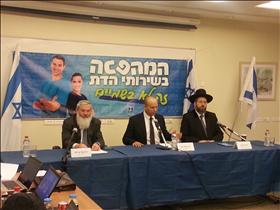Great strides for gender equality
Hiddush's advocacy results in greater female representation in Israel's religious establishment
Hiddush's consistent efforts to implement gender equality in Israel's religious establishment and supportive research have begun to pay off in several encouraging developments in different religious councils and Knesset legislation.
09/06/2014 13:44
Tags: gender equality · religious councils · Jerusalem · Chief Rabbinate · Eli Ben Dahan · Ministry of Religious Services

(L-R) Deputy Minister of Religious Services Rabbi Eli Ben-Dahan, Minister of Religious Services Naftali Bennett, and Ashkenazic Chief Rabbi David Lau at the kosher reforms press conference. picture: Ministry of Religious Services
Following Hiddush's demand for female representation in the elections committee for Jerusalem's Chief Rabbi, the Ministry of Religious Services replaced a male member on the committee and appointed a women in his place. This is the first time a woman will sit on this important committee in the history of Jerusalem's Chief Rabbinate elections. The Ministry of Religious Services and the Jerusalem Municipality had initially established the committee with only male members. But Hiddush, representing a number of women’s rights and religious freedom organizations, made a strong demand to the Ministry, threatening to take legal action if the exclusion of women on the committee was not reversed.
This achievement was complemented by another significant victory for gender equality in Israel's religious councils. Four women were just selected to serve on Raanana’s Religious Council, which constitutes 44% of the nine-member council. Hiddush has been monitoring the dismal representation of women on religious councils for some time now, and have recently received assurances from both the Attorney General and the Ministry of Religious Services that the situation will be corrected in the upcoming appointments. Hiddush will continue to monitor the implementation and taking the necessary steps, in partnership with like-minded NGOs, if need be.
Most recently, statistics on women's participation in religious councils, prepared by Hiddush, were used in MK Aliza Lavie's law proposal for equal representation of women on religious councils.
These are important steps in the battle for gender equality, to which Hiddush is no stranger. We have consistently been tracking the number of women appointed to Israel's religious councils in previous years as a part of our efforts to increase their representation in these councils. We have maintained constant communication with the Ministry of Religious Services to remind them of their obligation to advance gender equality. Additionally, we advocated to Israel's Attorney General to adopt affirmative action to include more women in senior positions in these committees and councils.
Hiddush Vice President, Shahar Ilan recently spoke at a conference in collaboration with several of the other women's rights organizations dedicated to promoting greater female representation on Israel's religious councils. A central aspect of the conference was to collect a database of names of women who are willing to serve on religious councils to avoid claims that there are no women willing to serve on these committees.
A few days later, MK Aliza Lavie proposed a law for equal representation of women on religious councils. The bill included Hiddush's statistics and stated that "Hiddush's report found that women make up only 5% of all [religious] council members. Only one out of 20 members is a woman, only one-third of religious councils have a female member and as of today, none of them are chaired by a woman."
Following these consistent efforts, Deputy Minister of Religious Services Rabbi Eli Ben-Dahan certainly understands that no critical decision, such as selecting the Chief Rabbi of Jerusalem, can be made without proper female input. Additionally, Hiddush's advocacy has made it clear to him and his ministry that it is not enough to appoint women to Israel's Religious Councils, but they must be allowed to serve in senior positions on these councils and have the same opportunities that have been accorded to men for decades.